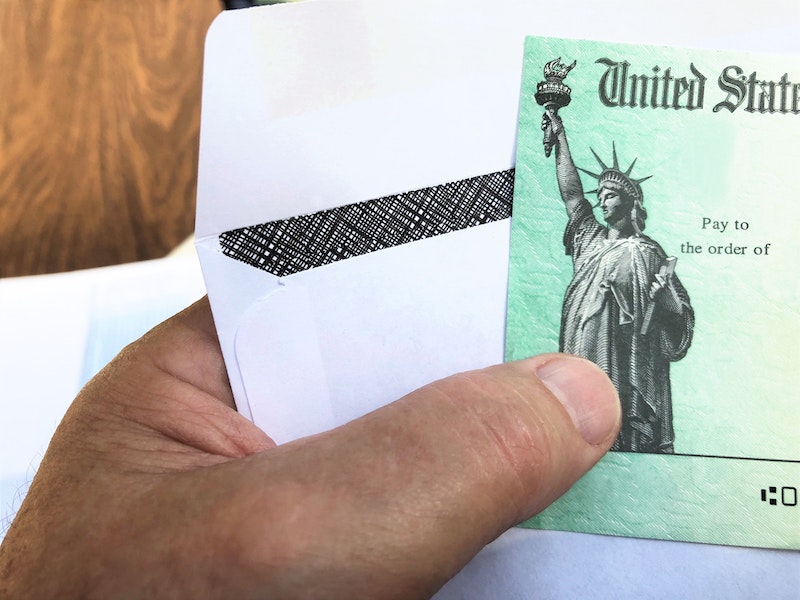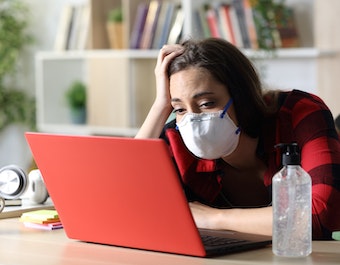COVID-19 has caused anxiety not only about our physical health, but our financial well-being, too. Many people have lost work, or have seen their incomes go down and need some support. We know that financial stress only makes these times harder, but there is some relief available to get you through tough times.
The biggest piece of the financial relief puzzle, so far, has come from the federal government’s $2.2 trillion Coronavirus Aid, Relief, and Economic Security Act (CARES). The act provides funding and regulation changes for everything from unemployment to student loans to federally backed mortgages.
Two good government resources to visit are Benefits.gov, where you can search for state and federal resources for everything from food to housing, and the National Governors Association, which links to the governor’s office in every state, where you can go to find out more. Most of the states’ sites have banners on the homepage directing people to their COVID-19-related resources. It’s a good idea to regularly check federal, state and city government sites for updated information on their COVID-19 related resources.
Help is out there, but it can be overwhelming to know where to start. With that in mind, we’ve provided the guide below to help point you in the right direction and know what to expect.
How to Get Your Economic Impact Payment
As part of the CARES Act, many Americans will receive an economic impact payment. Single adults with an adjusted gross income of $75,000 or less (you can find that number on your tax return) will receive $1,200 and married joint filers who make $150,000 or less will receive $2,400. The payment is gradually reduced for those who have incomes above those amounts. Single adults making more than $99,000 and married joint filers without kids making more than $198,000 will not receive a payment. Eligible parents receive an additional $500 per dependent child age 16 and younger.
The stimulus money will be automatically deposited into the bank account listed on your latest tax return. If you don’t usually file a tax return, but you get Social Security, the money will also automatically be sent to you. If the IRS doesn’t have your bank account information, the check will be mailed to you, but it might take longer.
How to File For Unemployment
Some of the biggest changes in the CARES Act are to unemployment. The changes include extending unemployment by up to 13 weeks, so most states will now provide benefits for up to 39 weeks. Unemployment payments will also go up by an additional $600 a week on top of typical state unemployment benefits through July 31. To apply for benefits, visit your state’s unemployment website.
States also now have the option of offering unemployment if:
- Your employer has to stop operating, preventing employees from working, because of COVID-19
- You are quarantined with the expectation that you will go back to work
- You leave your job because of risk of infection or to care for a family member
The other major change is that unemployment benefits are now available to self-employed workers like independent contractors, freelancers, and gig workers who can no longer work because of COVID-19. This is part of the new Pandemic Unemployment Assistance (PUA) program. States have been playing catch-up to handle both the huge spike in unemployment claims from traditional unemployment as well as how to handle the new PUA claims. Many states are beginning to accept PUA applicants, so keep checking your state’s unemployment website to make sure you can apply.
How to Get Paid Sick Leave
You might be worried about what happens if you get sick or need to take care of a sick loved one. A new law, the Families First Coronavirus Response Act (FFCRA), offers paid sick leave in certain situations for people who work for companies with 500 or fewer employees. Companies with 50 or fewer employees can waive some of these requirements if it would cause them financial harm. You can apply for the leave through your employer.
If you qualify, you may be able to receive:
- Two weeks (up to 80 hours) of paid sick leave at your regular rate of pay if you can’t return to work because of a forced quarantine and/or you have COVID-19 symptoms and are seeking a medical diagnosis.
- Two weeks (up to 80 hours) of paid sick leave if you can’t work because you have to take care of someone who is quarantined, or to care for a child if your child's school or child care provider is closed or unavailable because of COVID-19.
- Up to 10 additional weeks of paid leave at two-thirds pay is also available because of school or child care closures.
How to Get A Loan
It may not make sense for you to take on more debt right now, but many banks and credit unions are offering low-interest loans. If you own a small business, you also could be eligible for a Small Business Association (SBA) loan. The SBA is offering low-interest Economic Injury Disaster Loans. The SBA has also offered Paycheck Protection Program loans, to cover payroll for eight weeks. The fund ran out of money at first due to high demand, but Congress allocated more, so keep checking if you don't have luck at first.
How to Get Mortgage or Rent Relief
As part of the CARES Act, if you have a federally backed mortgage like those owned by Fannie Mae or Freddie Mac, you may be able to stop paying your mortgage for up to 12 months if you’re facing COVID-19-related financial issues. But don’t just stop paying; you’ll need approval from your mortgage service, whose number should be on your monthly mortgage statement. To find out if you have a federally backed mortgage, search here. The government has also banned foreclosures on these loans for 60 days.
For non-government-backed mortgages, the American Banking Association is tracking offers from banks around the country such as those deferring mortgage payments; reducing or waiving fees; or providing low or no-interest loans. The Credit Union National Association, meanwhile, has a state-by-state guide on what credit unions are offering.
If you rent and your landlord has a mortgage from Fannie Mae or Freddie Mac, there is an eviction moratorium through July. Many states are also banning evictions for a time. Several cities and counties have set up rent relief funds, which you can find by visiting your local government sites. The organization Just Shelter also lets you search by state to find a list of organizations that help with housing needs.
How to Pause Your Student Loan Payments
Good news — if you have an eligible federal student loan, you won’t have to pay it until Sept. 30. Your loan also won’t accrue interest during that time. You don’t even have to do anything; that’s happening automatically. You can still keep making your payments if you want, though. In that case, the money would first go toward previously accrued interest and then toward your loan balance.
You may also consider switching your student loan to an income-based repayment plan. These plans base your payments on a percentage of your discretionary income. You’ll likely wind up paying more interest on your student loans over time, but it could make your future monthly payments much more manageable.
If you have a private student loan, you’re not necessarily out of luck. Some private lenders are also offering relief, so it’s worth calling your loan provider to see if they can help.
How to Find Special Support
Service and freelance workers have been hit hard by the shutdown of many businesses. Several organizations are offering support specifically for service, gig, or freelance workers, including:
One Fair Wage — Providing an emergency fund for tipped and service workers such as restaurant servers and delivery drivers.
Restaurant Workers’ Community Foundation — Providing direct monetary assistance to people who work in the food and beverage community.
Freelancers Relief Fund — Offering up to $1,000 per freelance household for expenses like food and utility payments.
Microloans for Journalists — Providing interest-free $500 loans for journalists who have been laid off, furloughed, or had their work hours reduced.
Don’t see a relief fund for you? Try a Google search to see if there are any emergency funds for workers in your industry.
Note to our readers: This information is being made available as a free resource to the public. It is not an endorsement of any of the Finance-Related Resources listed in this article — financial consultants, planners, services, organizations/associations, websites, tools, lenders, credit unions, or banks. None of the Finance-Related Resources listed have solicited Rally Health to be included, and Rally Health receives no compensation from the Finance-Related Resources mentioned in this article.
JENNIFER THOMAS
Rally Health





